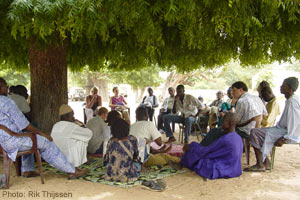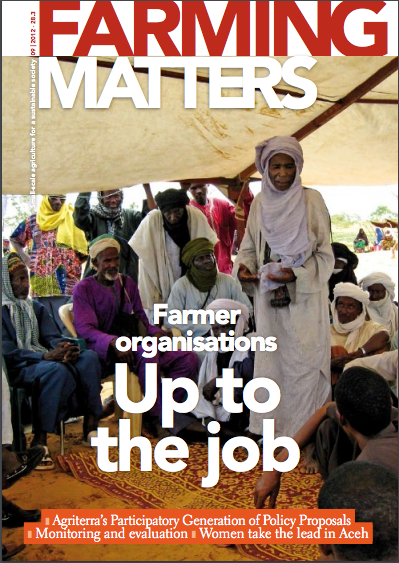Many people were disappointed with the outcome of the Rio+20 conference in June. Nonetheless, it was a very good opportunity for many representatives of the civil society, from practically all countries, to gather and discuss the challenges that still exist for transforming the global agricultural system into one that respects and supports family farming and agro-ecology. What can we do now to capitalise on the results of the conference and keep the Rio+20 momentum going? Who should we work with? Partners of the AgriCultures Network share their ideas.
Awa Faly Ba: “We need better bridges”
Every analysis of what happened in Rio needs to look back at the expectations we all had. We wanted political decisions to be taken, and clear commitments from world leaders, so it has been a disappointment that this did not happen – especially when compared to the first Rio meeting and to the enormous challenges we see now, 20 years later. But the representatives of many organisations were able to present and share the solutions they advocate, and which they are trying out in their own sphere of influence, at the People’s Summit and elsewhere. This can be seen as a very positive result.

According to Awa Faly Ba, editor of AGRIDAPE, Rio showed the gap between the civil society and decision-makers, and the different expectations of the two groups. “What we need to do is develop better bridges between those who are trying interesting initiatives in the field and the authorities and decision- makers, and thus link both processes.” This is not something that can be achieved in a one-off event, but is a long-term process which will help us influence policy processes at the local level.
Better bridges can help those representing farmers and consumers to voice the opinions and needs of these farmers or consumers, and also help them provide feedback. “Those who went to Rio cannot just go back to their job. There is an urgent need to provide feedback, and to involve everybody in the preparations for future meetings. We need better bridges, but that is something that all stakeholders need to build together.”
KVS Prasad: “Our job starts now”
Many analysts have concluded that Rio+20 gave them a “more-of-the-same” feeling, of “business as usual” once again, or that this was just another platform for governments or international organisations to continue pursuing their own agenda. But many other voices were also heard during the conference, and the concerns of the readers of this magazine were also discussed. It has been very encouraging to hear these different voices, and especially “to see that they are so many”, said KVS Prasad, Executive Director of the AME Foundation.
He finds it comforting to think of the large number of voices and opinions heard in favour of family farming and agro-ecology. “The Rio+20 conference gave us a great opportunity to see how strong we are, and how strong we can be”. What we need to do now is to look at the all the contacts made, and to further develop them into ‘relationships’ so that we move forward. “We cannot expect to see outcomes and outputs immediately, but we can nurture these relationships, developing something like a ‘real life Facebook’ that will not only let us keep in touch, but actually help us work together towards our common and shared goal. In this sense, our job starts now.”
Teresa Gianella: “Translate, and continue”
Good or insufficient, the results of Rio+20 run the risk of getting lost if they are not “translated”, or at least analysed with a local level perspective. Teresa Gianella, editor of LEISA revista de agroecología, thinks that this is especially necessary in Peru and in Latin America in general, where social differences are huge, and where “one-size-fits-all” approaches are particularly difficult. There is an urgent need to look at how the discussions and agreements reached, or at how the issues raised in Rio, relate to the growing inequalities that go hand in hand with the impressive figures of economic growth.
“What we need to do is to translate what we’ve talked about and heard, looking at the macro and at the micro contexts: at the initiatives that are being tried at a national level, but also at what’s happening in, for example, a village that is resisting the expansion of large-scale mining enterprise.” This translation is necessary to turn general proposals into concrete action plans.
Equally important is the need to look in more detail at agriculture, at the problems that small-scale farmers are facing, and at the enormous contributions they can make.“Rio+20 needs to be linked to the International Year of Family Farming”. While it may not be necessary to organise a large-scale world conference again, we may need “to follow its example”, and encourage a large scale exchange of opinions and discussions that are based on what is happening, and on what needs to happen, at a local level.

